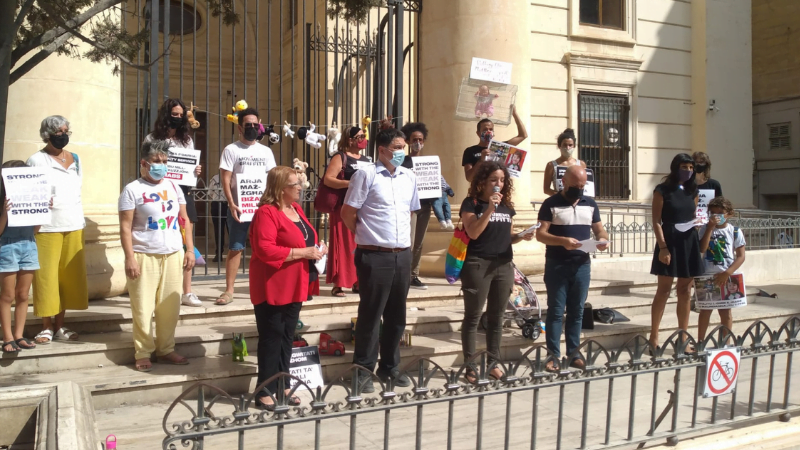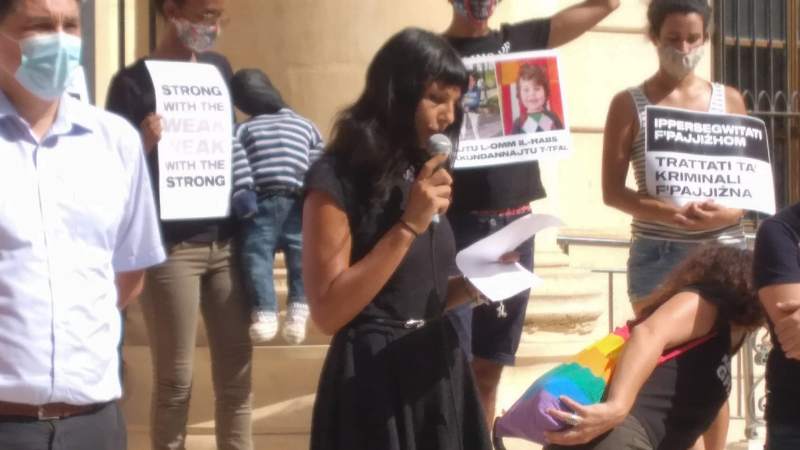The Shift journalist Julian Delia was harassed outside the law courts earlier today by an official claiming to be the chief security officer of the courts, demanding the journalist’s phone to delete photos taken. He accused the journalist of filming people going in and out of court without asking the court’s permission while he was covering a protest.
The journalist, who was outside the main entrance to the law courts snapping pictures of the children’s toys that were hung up against the iron railing of the court in a symbolic action organised by four NGOs earlier today, was accosted by the official and accused of filming video featuring the faces of people going in and out of court after another official claimed that the journalist had stuck his phone camera beyond the railings, still outside court.
The officer in question then attempted to coerce the journalist into handing over his phone to delete any images that contained the faces of people going in and out of court. Delia did not oblige, arguing that he had stood outside with the rest of the protesters and that any faces accidentally featured in any photos would be blotted out while pointing out that the official had no right to ask for access to his phone.
The court officer then threatened the journalist with police action. A police officer was summoned but did not take up the court official’s demands, which again led to the court official insisting on accessing the journalist’s photos.”If you’re a real journalist, you should know you’re not allowed to take photos,” the court official said, despite a group of journalists reporting the same event.
“If you don’t want to show me your phone, then you’ve done something wrong,” the court official added. The journalist replied, “you have no right to look at my phone”.
The Shift filed a formal complaint with the justice ministry and the court agency CEO. While the ministry did not reply, the court agency CEO argued that “according to the chief security officer, the journalist Julian Delia was seen taking footage of the persons entering the court including personnel working within the Court Services Agency on the premises of the Courts of Justice and therefore the attention of the chief security officer was drawn to this incident”.
The journalist did not, in fact, take any sort of footage of people entering the court, nor its personnel. The Shift’s legal team responded to the court’s claims by pointing out that the legal restrictions which forbid “any photograph or film” on the court’s premises do not apply to an activity taking place outside of the courts or the incidental capture of images of individuals who may be entering or leaving the court.
“Contrary to the assertion made by the unnamed ‘chief security officer’, Mr Julian Delia was carrying out his journalistic duties outside the precincts of the courts… covering the protest that was taking place. President Emerita Marie-Louise Coleiro Preca was among the protesters… My clients are fully aware of the restrictions on their activities when such are intended to take place within the precincts of the court.
An activity taking place outside the courts, even if on the stairs of the building, does not fall within the scope of these restrictions, and nor does the incidental capture of images of individuals who may be entering or leaving the courts. If this were to be the case, I doubt that any of the many hundreds of photographs of celebrating accused found not guilty, politicians making some point or other and their advocates that have been published over the years are compliant and your ‘chief security officer’ may have been more than slightly negligent in the past,” lawyer Andrew Borg Cardona informed the court services agency.
NGO Repubblika expressed its solidarity with the journalist, saying nothing has been learnt from the findings of the public inquiry into journalist Daphne Caruana Galizia’s assassination.

Former President Marie-Louise Coleiro Preca was among the activists.
‘Strong with the weak, weak with the strong’
In a press conference held in front of the law courts, four organisations protested a court decision to issue a six-month prison sentence to two Turkish mothers who had fleed their home country after a failed coup in 2016, demanding a sentence that does not separate the mothers from their children.
A group of around 30 people gathered in front of the courts bearing placards, toddler dolls stuffed into cages, fairy tale books, teddy bears, dinosaurs and unicorns, a colourful display meant to highlight the plight of two young boys who will not see their mothers for the next six months after Rabia Yavuz and Muzekka Deneri were sentenced on 30 July.
Moviment Graffitti, aditus foundation, the social workers’ association and Eurochild expressed their shock and anger at the sentence, arguing that “the criminal justice system is being strong with the weak and weak with the strong”, labelling the six-month sentence for forgery of documents an example of “institutionalised racism”.
The Turkish mothers, whose plight was originally brought to focus in local media after The Shift published an article about their sentencing and the possible consequence of their deportation, were teachers who had left Turkey in 2016 but unable to renew their residency permits.
Yavuz and Deneri are not the only two people fleeing war and persecution who served a prison sentence in Malta for forging passports or some other form of identification. Besides Turkish citizens running away from their government’s crackdown on dissidents, news reports in January revealed that 443 individuals were arrested and jailed in Malta on fake passport charges in just two years.
“We would like to reiterate our position regarding the inhumane and unjust judgement whereby two migrant mothers were handed this sentence by the court for the use of forged passports, leaving their young children ‘orphaned’ by the system,” the organisations said in a press statement.
“We call for an immediate redress of this practice and for the application of more humane and effective alternatives, which reflect the humanitarian nature of migration and asylum seeking rather than their criminalisation,” the press statement continues.
Besides prosecution within the Turkish state’s jurisdiction, the UN’s special rapporteur on the human rights of migrants had, in May of last year, reported how the Turkish government signed secret deals with Afghanistan, Azerbaijan, Lebanon, Pakistan and several other countries. The deals were signed to give the Turkish government an all-clear to abduct and forcibly return Turkish nationals who had escaped persecution.
Human rights organisation Aditus Foundation pointed out how the two Turkish women “came to Malta in search of safety for themselves and their children”.
“This is certainly not the first time that Malta punishes people who, attempting to flee their homes due to persecution or wars, have no other option but to resort to illegal means to bypass stringent border laws and regulations,” Aditus director Neil Falzon said.
Speaking on behalf of Graffitti, Mary Grace Vella added, “nothing in the law precludes the court from handing down a community-based sanction in lieu of imprisonment in such cases”.

Moviment Graffitti activist Mary Grace Vella speaking at the press conference earlier today.
“Community-based sanctions under the Probation Act are routinely utilised for offences which carry a sentence of up to seven years imprisonment and for offences which pose more harm to victims of crime and society in general compared to the use of forged documents by asylum seekers,” Vella said.
“It is thus clearly the case, that in such instances, the criminal justice system is being strong with the weak and weak with the strong,” she continued.
Graffitti also referred to a statement issued by children’s commissioner Pauline Miceli, who also urged the court to redress its jail sentence to minimise the harm done to the children.
Former President of Malta Marie-Louise Coleiro Preca, speaking on behalf of Eurochild, said she felt “embarrassed and worried” about the “obscenity” of the sentence issued by the magistrate’s court.

A close-up shot of one of the toys hung up in front of the court earlier today.
“I am here to remind everyone of what our countries, our authorities and our law courts have been committed to for a long time; 62 years ago, the international community, including our country, were signatories for the declaration of children’s rights,” Coleiro Preca said.
“We ratified the UN convention on children’s rights; 11 years ago, Malta, in the Council of Europe, signed the guidelines for how courts should be child-friendly,” she continued.
“And yet, we are still seeing these obscenities – there are no other words to describe this. Whoever the children may be, they are still children. I am embarrassed and worried because children deserve the best we can give them,” she added.
Social workers’ association president Andrew Azzopardi said his association was “appalled” at the sentence and argued that the court had “aggravated the trauma” of people who had experienced human trafficking.
“The justice system is failing the most vulnerable in our society, and this judgement is hugely disproportionate,” Azzopardi said.
“Without proportionality, the law courts are meaningless. Alternative community-based consequences for parents should be considered, the decision taken last week should be reversed via any legal means that are available, as stated by the children’s commissioner, as well,” he added.













I sincerely commend the former President Coliero Preca’s presence in this call for better justice held before the courts today. I had hoped that if she had also crossed the road and stood in silence before the Great Siege Monument for ten seconds, that message would have brought more unity and done more good to the country than all the forced apologies and empty words presently being uttered by those in high office.
An elegant thought and image
I can’t understand how we finish to be samaritani. Regarding the children issue. She passed thought 2EU’ borders . Yes my National Security come first . Wrong doing.. Is wrong. Anyway, from point of view. Tax money problema.
They are miserable and the “CEO” of the Court Services Agency (ex – Directorate-General) Frank Mercieca is a clown-puppet of the Minister. The Minister does not like the Shift – hence they try to boycott their journalists whenever they can.
A “funny thing” is that this “security officer” was claiming GDPR rights against this Journalist. A Journalist. The GDPR has an exception bigger than Castille’s corruption: the freedom of information. The right to access to public information usually comes over the right to data protection when they are not compatible.
Another “funny thing” is that these people do not know what GDPR is, nor what its contents are.
They use “GPDR” (and any senseless interpretation of any law they may find) as an excuse to attack the weak and to defend the strong. This attack to the shift’s journalist was just another example.
Another example is when the CEO of the Court Services initiated proceedings against persons requiring to access to public information on grounds of “GDPR”. This access was granted by the Information and Data Protection Commissioner taking into account also the GDPR, but an appeal before a Tribunal chaired by Anna Mallia has been stalled for many years. An administrative tribunal (IDPAT) that should process appeals in a writing manner when they relate to points of law and within a couple of weeks, takes years to decide upon freedom of information requests appealed by public authorities, emptying the right to public information.
Anna Mallia has of course stalled the proceedings while she pockets public money from this and other public positions and while she defends the likes of Y. Fenech.
Enough said about anna mallia – the niece of tarcis mifsud. her iced bun is still being baked.
anna mallia is another arrogant lawyer with a big ego.
So, what hope for total reform of journalism in Malta?!!
That guy must be a close relative to Lukashenko.